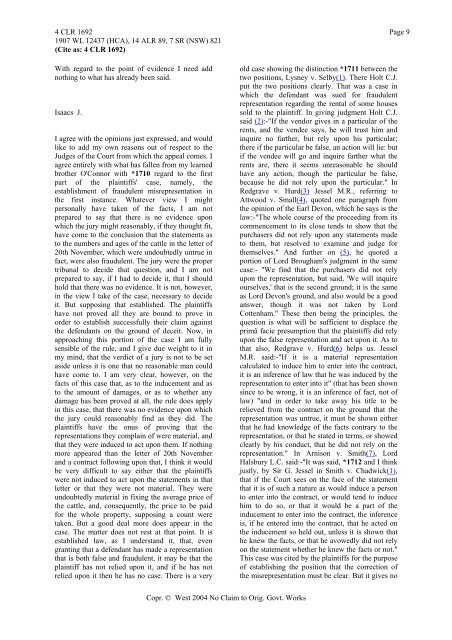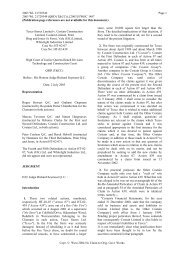Holmes v Jones - Thomson Reuters
Holmes v Jones - Thomson Reuters
Holmes v Jones - Thomson Reuters
- No tags were found...
You also want an ePaper? Increase the reach of your titles
YUMPU automatically turns print PDFs into web optimized ePapers that Google loves.
4 CLR 1692 Page 91907 WL 12437 (HCA), 14 ALR 89, 7 SR (NSW) 821(Cite as: 4 CLR 1692)With regard to the point of evidence I need addnothing to what has already been said.Isaacs J.I agree with the opinions just expressed, and wouldlike to add my own reasons out of respect to theJudges of the Court from which the appeal comes. Iagree entirely with what has fallen from my learnedbrother O'Connor with *1710 regard to the firstpart of the plaintiffs' case, namely, theestablishment of fraudulent misrepresentation inthe first instance. Whatever view I mightpersonally have taken of the facts, I am notprepared to say that there is no evidence uponwhich the jury might reasonably, if they thought fit,have come to the conclusion that the statements asto the numbers and ages of the cattle in the letter of20th November, which were undoubtedly untrue infact, were also fraudulent. The jury were the propertribunal to decide that question, and I am notprepared to say, if I had to decide it, that I shouldhold that there was no evidence. It is not, however,in the view I take of the case, necessary to decideit. But supposing that established. The plaintiffshave not proved all they are bound to prove inorder to establish successfully their claim againstthe defendants on the ground of deceit. Now, inapproaching this portion of the case I am fullysensible of the rule, and I give due weight to it inmy mind, that the verdict of a jury is not to be setaside unless it is one that no reasonable man couldhave come to. I am very clear, however, on thefacts of this case that, as to the inducement and asto the amount of damages, or as to whether anydamage has been proved at all, the rule does applyin this case, that there was no evidence upon whichthe jury could reasonably find as they did. Theplaintiffs have the onus of proving that therepresentations they complain of were material, andthat they were induced to act upon them. If nothingmore appeared than the letter of 20th Novemberand a contract following upon that, I think it wouldbe very difficult to say either that the plaintiffswere not induced to act upon the statements in thatletter or that they were not material. They wereundoubtedly material in fixing the average price ofthe cattle, and, consequently, the price to be paidfor the whole property, supposing a count weretaken. But a good deal more does appear in thecase. The matter does not rest at that point. It isestablished law, as I understand it, that, evengranting that a defendant has made a representationthat is both false and fraudulent, it may be that theplaintiff has not relied upon it, and if he has notrelied upon it then he has no case. There is a veryold case showing the distinction *1711 between thetwo positions, Lysney v. Selby(1). There Holt C.J.put the two positions clearly. That was a case inwhich the defendant was sued for fraudulentrepresentation regarding the rental of some housessold to the plaintiff. In giving judgment Holt C.J.said (2):-"If the vendor gives in a particular of therents, and the vendee says, he will trust him andinquire no farther, but rely upon his particular;there if the particular be false, an action will lie: butif the vendee will go and inquire farther what therents are, there it seems unreasonable he shouldhave any action, though the particular be false,because he did not rely upon the particular." InRedgrave v. Hurd(3) Jessel M.R., referring toAttwood v. Small(4), quoted one paragraph fromthe opinion of the Earl Devon, which he says is thelaw:-"The whole course of the proceeding from itscommencement to its close tends to show that thepurchasers did not rely upon any statements madeto them, but resolved to examine and judge forthemselves." And further on (5), he quoted aportion of Lord Brougham's judgment in the samecase:- "We find that the purchasers did not relyupon the representation, but said, 'We will inquireourselves,' that is the second ground; it is the sameas Lord Devon's ground, and also would be a goodanswer, though it was not taken by LordCottenham." These then being the principles, thequestion is what will be sufficient to displace theprimâ facie presumption that the plaintiffs did relyupon the false representation and act upon it. As tothat also, Redgrave v. Hurd(6) helps us. JesselM.R. said:-"If it is a material representationcalculated to induce him to enter into the contract,it is an inference of law that he was induced by therepresentation to enter into it" (that has been shownsince to be wrong, it is an inference of fact, not oflaw) "and in order to take away his title to berelieved from the contract on the ground that therepresentation was untrue, it must be shown eitherthat he had knowledge of the facts contrary to therepresentation, or that he stated in terms, or showedclearly by his conduct, that he did not rely on therepresentation." In Arnison v. Smith(7), LordHalsbury L.C. said:-"It was said, *1712 and I thinkjustly, by Sir G. Jessel in Smith v. Chadwick(1),that if the Court sees on the face of the statementthat it is of such a nature as would induce a personto enter into the contract, or would tend to inducehim to do so, or that it would be a part of theinducement to enter into the contract, the inferenceis, if he entered into the contract, that he acted onthe inducement so held out, unless it is shown thathe knew the facts, or that he avowedly did not relyon the statement whether he knew the facts or not."This case was cited by the plaintiffs for the purposeof establishing the position that the correction ofthe misrepresentation must be clear. But it gives noCopr. © West 2004 No Claim to Orig. Govt. Works
















